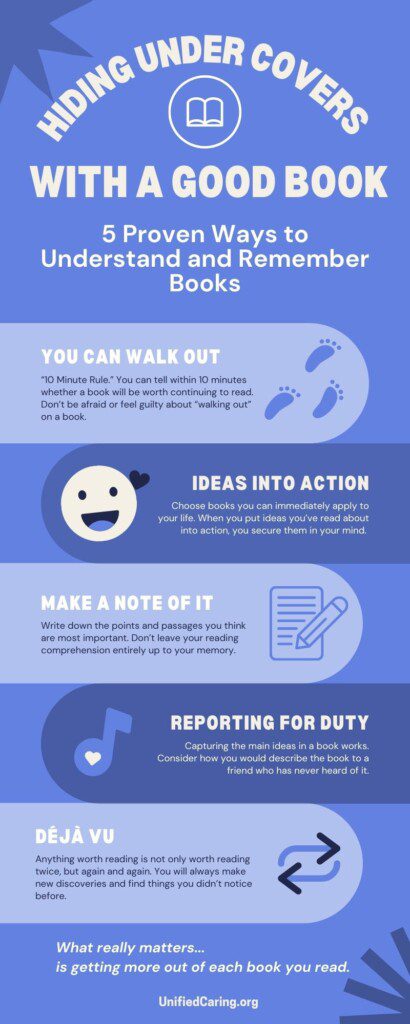The pandemic has driven up rates of anxiety and fear. It has also created more “free time” than most are accustomed to. But what to do with those extra precious hours that aren’t spent commuting or traveling or visiting? Some will hide under covers – literally. Others will figuratively do so – by reading more books!
Our teachers were right when they said, “a book is a friend.” And just like a best friend, a good book can also give you a new way to interpret your past experiences.
Silicon Valley executives explain that whenever you learn a new mental model or idea, it’s as if the software in your brain gets re-wired, re-booted, and updated. We could all stand to have our old data points run through a new program from time to time. It’s an excellent way to learn new lessons from old moments.
Reading Changes the Past
At least that’s what the poets say. But only if you can internalize and remember all the insights from the books you’ve read. So yes, it’s true that knowledge compounds over time, but only if it’s retained.
In a practical sense, what this means is that it’s not just about reading more books. What really matters is getting more out of each book you read.
And books don’t have to be a hard slog or an academic exercise, by the way. Gaining knowledge is great but reading just for the sheer pleasure of it is also a wonderful use of time. Even if you’re interested in moving caring forward – it begins with following your passion in the areas you care about most.
So whether you are reading to learn, or reading to dream, there are some proven ways to comprehend and remember all those words of wisdom.
You Can Walk Out
Some of the best movie critics have what they call the “10 Minute Rule.” They’ve seen so many films that they can tell within 10 minutes whether a movie will be worth sitting through. Don’t be afraid to apply this principle to books. It doesn’t take long to determine if something is worth continuing to read. Don’t be afraid or feel guilty about “walking out” on a book if it isn’t moving you in some way. With the time you save from quitting a book, you can start more books than you usually do. Or read the great books more than once.
Life is too short to not read the very best book you know of right now. Go out and find it!
Ideas into Action
Perhaps the best way to improve your grasp of a book you’re reading is to choose the books that you can immediately apply to your life. That’s because when you put ideas you’ve read about into action, you secure them in your mind.
Selecting books that you can use also provides a solid incentive to pay more attention.
G. K. Chesterton, the famous British writer, was once invited to a meeting of the leading intellectuals in England. They were asked if they were shipwrecked on an island, what would be the one book they would want to have with them. Everyone expected him to choose the Bible. But when it was his turn to speak, Chesterton said that if he were shipwrecked on a desert island, he’d like to have “Thomas’s Practical Guide to Shipbuilding.”
Remembering the material you read is particularly true when something important hangs in the balance.
Make a Note of It
Okay, admittedly the most obvious, but write down the points and passages you think are most important. If you own the book, go back to your college days and use a highlighter. It can be fun to borrow a book with yellow highlighter throughout, right? Some folks like to underline with a blue pen. Or write in the margins. Whatever is easiest for you. The point is not leaving your reading comprehension entirely up to your memory.
Reporting for Duty
Speaking of college days and time spent at the university . . . remember book reports? The practice of capturing the main ideas in a book is a sound one. It works. Consider writing up a short summary as soon as you finish a book. It doesn’t have to be daunting or formal. Start by merely trying to condense what was really important to you in just three sentences. Think about how you would describe it to a friend who has never heard of it, if that helps to get you going.
Déjà Vu All Over Again
Anything worth reading is not only worth reading twice, but worth reading again and again. Just like a symphony or painting or film. If it is worthwhile, then you will always be able to make new discoveries in it and find things in it that you didn’t notice before, even though you have experienced it many times.
For those of you who are middle-aged or older, have you recently listened to a song or album that you loved as a teenager? Did you pick up on themes in the lyrics that you are only now comprehending for the first time? It’s common. Because the challenges you deal with in life change over time. It’s not just catching something you may have missed before. It’s more about discovering new ideas and sentiments that are relevant to you at this stage of your life. The same thing is true of the best books. Different lines can jump off the page depending upon where you are at in life when you read them.

Finally, the best part about re-reading? Each time you return to the great authors, you’ll usually find they have something new to “say.” So, many happy returns to you!
By Mark Smith, contributing author
We are all working our way through a changed world as a result of the coronavirus pandemic. We may no longer be quarantined or under stay-at-home orders, but everyone is stretched to adapt like never before. All of us are in this together. Now more than ever, caring is what we need most. Caring for our self. Caring for others around us in our communities. Life now demands caring, resilience and compassion like never before. This is a great opportunity to create the world we want for our future generations. We invite you to join us in creating a caring movement!
Would you like to read more about UCA caring resources and products? We have other blogs on Unified Caring Association and our products, caring in our communities, and caring the UCA way!

